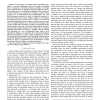Free Online Productivity Tools
i2Speak
i2Symbol
i2OCR
iTex2Img
iWeb2Print
iWeb2Shot
i2Type
iPdf2Split
iPdf2Merge
i2Bopomofo
i2Arabic
i2Style
i2Image
i2PDF
iLatex2Rtf
Sci2ools
PRDC
2015
IEEE
2015
IEEE
Scheduling Independent Tasks with Voltage Overscaling
Abstract—In this paper, we discuss several scheduling algorithms to execute independent tasks with voltage overscaling. Given a frequency to execute the tasks, operating at a voltage below threshold leads to significant energy savings but also induces timing errors. A verification mechanism must be enforced to detect these errors. Contrarily to fail-stop or silent errors, timing errors are deterministic (but unpredictable). For each task, the general strategy is to select a voltage for execution, to check the result, and to select a higher voltage for re-execution if a timing error has occurred, and so on until a correct result is obtained. Switching from one voltage to another incurs a given cost, so it might be efficient to try and execute several tasks at the current voltage before switching to another one. Determining the optimal solution turns out to be unexpectedly difficult. However, we provide the optimal algorithm for a single task, the optimal algorithm when there are o...
Related Content
| Added | 16 Apr 2016 |
| Updated | 16 Apr 2016 |
| Type | Journal |
| Year | 2015 |
| Where | PRDC |
| Authors | Aurélien Cavelan, Yves Robert, Hongyang Sun, Frédéric Vivien |
Comments (0)

